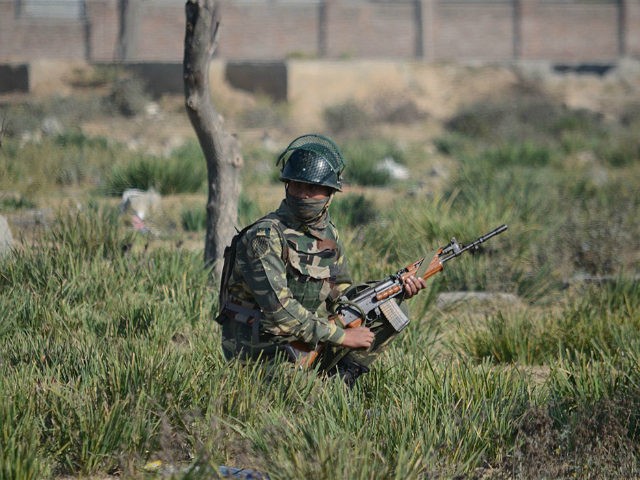The government of India changed the military rules of engagement on Monday along its border with China to allow soldiers to use firearms against the Chinese in “extraordinary” circumstances, Indian media reported.
The move is a response to the massacre that took place last week in the Ladakh region after Chinese People’s Liberation Army (PLA) soldiers reportedly pitched a tent on the Indian side of the border. When Indian troops challenged them, the soldiers, who also did not have permission to use firearms, attacked the Indian troops with rocks, sticks, and clubs wrapped in barbed wire. The bloody engagement reportedly left 20 Indian soldiers dead. The Chinese have refused to confirm any casualties, but Indian officials have said the Chinese lost at least twice as many people as the Indians.
The Chinese communist regime has insisted that PLA troops were legally within Chinese-occupied Tibet when Indian soldiers attacked. The incident occurred about a week after Chinese and Indian diplomats had announced a commitment to resolving longstanding territorial disputes in the Himalayas “peacefully.”
According to the Times of India, New Delhi revised the rules of engagement following the fight to allow soldiers “complete freedom of action” to defend their lives if attacked.
“The commanders can allow use of firearms and have full authority to respond to extraordinary situations using all resources at their disposal,” the newspaper asserted.
An unnamed Indian official reportedly told the newspaper that soldiers on the border, formally referred to as the Line of Actual Control (LAC), “have been told not to start a fight, but also not to hold back in the event of any ground intrusion or breach of airspace. … This obviously includes freedom to the commanders to order troops to open fire in the face of extreme provocation and extraordinary situations like the one near PP-14 on June 15.”
India has also reportedly repurposed federal funding to allow for greater investment into its Army, Navy, and Air Force. The Times of India listed the new funding as up to 5 billion rupees (about $66 million) “per procurement project.” New Delhi will also aid its troops, another report claimed, by attempting to stock up more quickly on Russian missiles, presumably for the border with China.
Indian Army Chief General MM Naravane is scheduled to visit the border, India’s Zee News reported on Monday, to “take stock of the ground situation.” Zee News noted that the visit will follow talks between Indian and Chinese diplomats seeking a peaceful resolution to border tensions. Naravane will follow Defense Minister Rajnath Singh, who visited the LAC on Sunday.
China has responded to India’s preparations largely through intimidation, using state media to claim that any Indian attempt to challenge China’s military would be met with “humiliation.”
“India will be more humiliated than after the 1962 border conflict with China if it cannot control anti-China sentiment at home and has a new military conflict with its biggest neighbor,” China’s state-run Global Times asserted on Sunday, citing “experts.”
The Sino-Indian War of 1962, also caused over a border dispute, was a decisive victory for China because it was a surprise attack and the Indian government, believing Beijing would never launch a military campaign against it, had not kept sufficient troops on its border to contain the 80,000 PLA soldiers attacking. Mao Zedong’s China invaded the Ladakh region after years of tensions with India related to Mao’s invasion and occupation of Tibet and the Dalai Lama’s subsequent exile in India.
“Indian government and military leaders understand how powerful China is, while Indian nationalists are ignorant and arrogant,” one of China’s Communist Party-approved “experts” told the Global Times. The newspaper also asserted that Beijing is not interested in a war with India because it is too busy planning to invade and colonize Taiwan.
The Global Times chief propagandist, “editor” Hu Xijin, wrote a personal essay warning that the Chinese would destroy the Indian military if New Delhi did not accept Beijing’s occupation of its territory.
“I must warn Indian nationalists: If your soldiers cannot even defeat Chinese soldiers in unarmed clashes, then guns and other firearms will not help them. The reason: The military strength of China is much more advanced and stronger than that of India,” Hu insisted.
As the Chinese communist regime refuses to confirm any casualties in last week’s massacre, Hu’s claims are entirely unsubstantiated. In the context of leaked intelligence reports surfacing in Indian media, they appear to be false, as the Chinese reportedly lost many more troops than the Indians.
“If 20 were martyred on our (Indian) side, then there would have been at least double the casualties on their (China) side,” Indian Roads and Transport Minister V.K. Singh said in an interview on Sunday, suggesting at least 40 Chinese deaths. India’s NDTV reported that among the Chinese casualties was a commanding officer of the PLA, citing unnamed sources.
China’s government refuses to confirm or deny those reports. A spokesman for the Chinese Foreign Ministry told reporters on Monday, “China and India are resolving the issue on the ground through military and diplomatic channels. I have no information to offer.”
The Global Times has claimed it necessary to hide the casualty counts to save India from the wrath of Chinese nationalist communists.

COMMENTS
Please let us know if you're having issues with commenting.